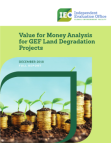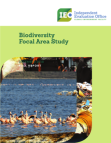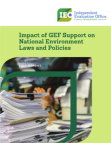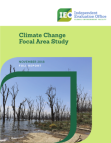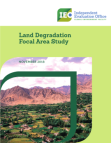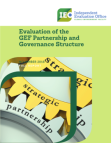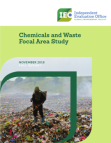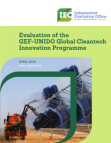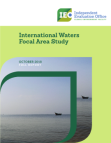This analysis brings together economists, computer scientists and geographers with expertise in remote sensing and impact evaluation to apply a value for money (VFM) assessment to the case of GEF Land Degradation (LD) projects. Leveraging methodological approaches to causal identification that…
Value for Money (VfM) 2016 - Analysis for GEF Land Degradation Projects
Evaluation of the Multiple Benefits of GEF's Support through its Multi Focal Area Portfolio (MFA)
Multiple benefits generated through GEF support consist of two types: the global environmental benefits (GEBs) that contribute towards achieving the strategic priorities of multiple focal areas, and the local environmental and socioeconomic benefits that indirectly generate and sustain the GEBs…
Biodiversity (BD) Focal Area Study 2017
As part of the Sixth Comprehensive Evaluation of the GEF (OPS6), the Independent Evaluation Office (IEO) has undertaken two studies in the Biodiversity Focal Area - a) an evaluation of the GEF funded projects on Access and benefit sharing (ABS) and the Nagoya Protocol (NP), and b) a…
Impact of GEF Support on National Environmental Laws and Policies in Selected Countries 2017
This evaluation examines how GEF-funded projects in six different countries led to changes in national legislative statutes and regulations.
This study looks at how Global Environment Facility (GEF) support has helped strengthen policy and legal frameworks around the world. It examines…
Climate Change (CC) Focal Area Study 2017
The main purpose of this study was to provide insight and lessons for GEF's climate change support moving forward, by assessing the relevance, results, effectiveness, and lessons learned through GEF support to the issues of climate change mitigation and adaptation. The findings of this…
Land Degradation Focal Area (LDFA) Study 2017
This comprehensive study covers GEF grant funding activities in agricultural lands, rangelands, degraded productive lands, desert lands, and combating deforestation and desertification.
The land degradation focal area (LDFA), established in 2002, combines the principles of a landscape…
Comparative Advantage, Adequacy of Funding / Financing, Health of the Expanded GEF Partnership and Governance Structure 2017
This evaluation addressed three key components of the Sixth Comprehensive Evaluation of the Global Environment Facility (GEF) (OPS6): the comparative advantage of the GEF as a funding channel, the adequacy of donor funding/financing, and the current governance structure and health of the…
Chemicals and Waste (CW) Focal Area Study 2017
This study is the first comprehensive study of the Chemicals and Waste (CW) focal area undertaken by the Global Environment Facility's (GEF) Independent Evaluation Office (IEO), encompassing the GEF's grant funding for activities focused on persistent organic pollutants (POPs), ozone depleting…
Evaluation of the GEF-UNIDO Global Cleantech Innovation Programme 2018
The Global Environment Facility/United Nations Industrial Development Organization (GEF/UNIDO) Global Cleantech Innovation Programme (GCIP) for small and medium enterprises (SMEs) seeks to encourage cleantech entrepreneurial solutions for pressing environmental and economic challenges,…
International Waters (IW) Focal Area Study 2016
The Independent Evaluation Office recently undertook a third study of the International Waters focal area, with the previous ones completed in 2002 and 2005. The purpose of this study is to provide insights and…
